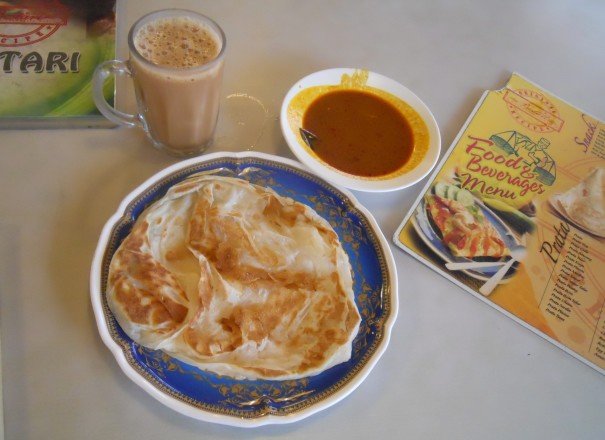
Sometimes You Need to Go Where Everybody Knows Your Order

Sometimes You Need to Go Where Everybody Knows Your Order
Roti Canai in Kuala Lumpur
It was my last day in Kuala Lumpur, Malaysia, after a year’s stay. My friend Kamisah and her husband Shahrum dropped by the condominium to share my last Malaysian breakfast. We walk to my favorite mamak shop, as the 24-hour Indian restaurants are called. The word “mamak” comes from the Tamil word for uncle. An apt word for a place that has become a second home to me.
We looked for the best table and end up walking through the restaurant to a table outside to enjoy the fresh air. Before I could even sit down, my teh tarik arrived, to our delightful surprise. I was happy and sad at once. It felt like the line from Cheers: “Sometimes you want to go where everybody knows your name.” The boys at Bestari didn’t know my name, but I am so touched that they know what I like.
Teh tarik (pulled tea) is the milky tea that is poured from an enamel mug held high above into a glass several times to cool it down and also give it a layer of froth. It is the essential accompaniment to the national staple of Malaysia, the roti canai (pronounced chanai). Here, they know exactly how I like my teh tarik and roti. I am a bit fussy with my food. The teh tarik is usually made with condensed milk, so it is too sweet. I got them to make mine with evaporated milk, and just the right amount. The roti has to be garing: crispy.
I glanced towards the counter where the mamak is throwing a piece of dough in the air a few times before folding it and throwing it on the griddle. As he looks up I put up three fingers and he nods. I give him the thumbs up.
The roti canai came within a short time, crispy as expected, with a small dish of curry sauce. That’s all you need. The best way to enjoy this pancake, which hails from South India, is to use your fingers. Take a small piece, dip it in the curry and savor every morsel.
Roti canai is not just food. It is a culture. It represents different things to different people. It is an elixir when you’re feeling tired or stressed. Sitting at that table anticipating the arrival of your roti is as relaxing as putting the kettle on back in England. At the start of the day, it gives you energy. Friendships are forged over a roti like the English do over a cuppa. The English Premier League and the World Cup are usually watched in a mamak shop with a roti and a teh tarik. And in the wee hours of the morning, when the pubs are closed, you can pop into the mamak’s for a hot roti and teh tarik to sober up. For the impoverished backpacker spending a year out traveling east, the roti canai is cheap food, at less than US $1.
For those new to Malaysia it is a delightful spectacle to see the mamak flipping the dough in the air to lighten it. You need a fast camera to catch the flying roti. Competitions are held to crown the king of roti canai flipping. The last king has now found a vocation in a roti canai joint in Australia, flipping his way into many a Facebook post.